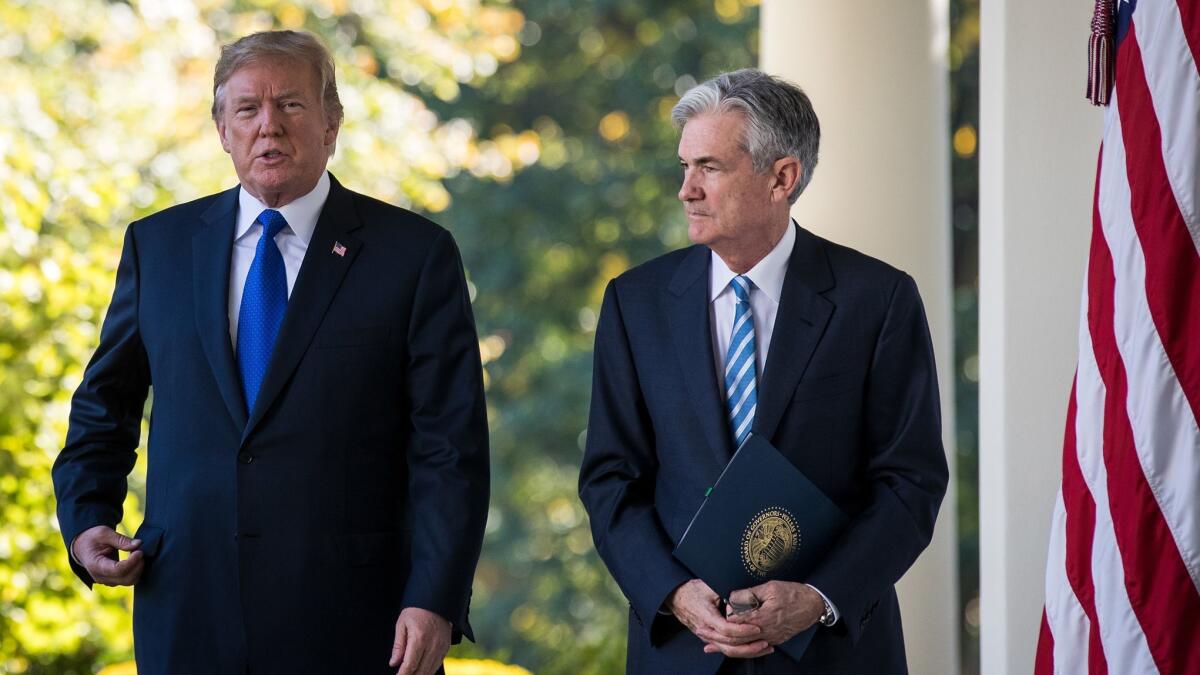Trump dines with Federal Reserve chair Powell, a frequent target

- Share via
President Trump had a special guest for dinner Monday night: Federal Reserve Chairman Jerome Powell, a frequent target of the president’s criticism. Trump has repeatedly called the Fed “crazy” in recent months and accused the central bank of hurting the economy.
Trump and Powell dined on steak for about an hour and a half Monday in the White House residence, according to a person familiar with the meeting. They were joined by Richard Clarida, vice chairman of the Fed, and Treasury Secretary Steven Mnuchin, who pushed the president to nominate Powell in late 2017.
The last time Powell and Trump met face to face was when Powell interviewed for the job in fall 2017.
Powell “did not discuss his expectations for monetary policy, except to stress that the path of policy will depend entirely on incoming economic information and what that means for the outlook,” the Fed said in a statement issued after the dinner. The Treasury Department and the White House did not respond to requests for comment on the meeting.
Trump said in late November that he was “not even a little bit happy” that he had nominated Powell for the central bank’s top job, but aides have been pushing the president to meet with Powell again. Trump often warms to people after meeting them in person, and Powell is well liked on Capitol Hill by Republicans and Democrats.
Trump has said he believes the Fed is hiking interest rates too quickly, harming the stock market and broader economy. Since Powell took over as Fed chairman a year ago, the Fed has raised interest rates four times, to a range of 2.25% to 2.5%, the highest level in more than a decade, although still low by historical standards.
After the central bank raised interest rates in December, Trump was so irate that he asked close advisors whether he could fire Powell. The Fed is supposed to be independent from politics, and it is hard to remove a Fed governor except for “cause,” which has typically been interpreted by courts as egregious wrongdoing. Top White House officials have said they do not believe the president has the authority to remove Powell, although the president himself never said he would not try to do it.
Last week, the Fed said it would be “patient” about any future rate hikes, a statement widely interpreted on Wall Street to mean that the central bank will not raise interest rates again for several months — and may not raise rates again at all unless the economy outperforms.
Powell vigorously denied that politics played any role in the Fed’s decision-making, saying at a news conference Wednesday: “We’re never going to take political considerations into account.”
The Fed said Powell told the president the central bank would continue to set interest rates “based solely on careful, objective and non-political analysis.”
Although Trump has tweeted and said publicly that he’s displeased with Powell and the central bank, both the White House and the Fed said the president has not personally asked Powell to take a certain course of action on interest rates.
It is rare for a president to meet with the Fed leader, although not unprecedented. Then-President Obama met with then-Chairwoman Janet Yellen in 2016, for example. But presidents are not supposed to dictate Fed policy.
Fed leaders believe they must be independent or else faith in the central bank will plummet and the Fed won’t be able to do its job effectively to regulate banks and keep the economy from overheating.
More to Read
Inside the business of entertainment
The Wide Shot brings you news, analysis and insights on everything from streaming wars to production — and what it all means for the future.
You may occasionally receive promotional content from the Los Angeles Times.










